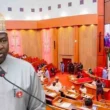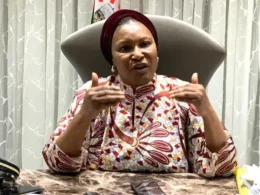Dangote Petroleum Refinery and Petrochemicals has taken legal action against the Nigeria Midstream and Downstream Petroleum Regulatory Authority and some major importers in the oil and gas sector at the Federal High Court in Abuja.
In suit number FHC/ABJ/CS/1324/2024, Dangote Refinery sought N100bn in damages from NMDPRA for continuing to issue licences for the importation of refined products such as Automotive Gas Oil and Jet-A1 (aviation fuel).
Dangote claimed the refinery’s production exceeded domestic consumption levels, rendering imports unnecessary.
But oil marketers kicked against this, stressing that the market had been deregulated and dealers were free to import the commodities or buy from the $20bn Lekki-based refinery.
Dangote also sought the cancellation of import licences granted to the Nigerian National Petroleum Corporation Limited, Matrix Petroleum Services Limited, A. A. Rano Limited, and four other firms.
Joined as defendants in the case were NMDPRA, NNPCL, AYM Shafa Limited, A.A. Rano Limited, T. Time Petroleum Limited, 2015 Petroleum Limited and Matrix Petroleum Services Limited.
The refinery alleged that these imports sabotaged its operations by flooding the market with refined products it already produced without shortfalls.
The plaintiff (Dangote) contended that NMDPRA violated sections of the Petroleum Industry Act by issuing import licences despite no evidence of product shortfalls. Dangote accused the regulator of neglecting its statutory role to promote local refineries.
According to an affidavit by Ahmed Hashem, Dangote refinery’s General Manager, Government and Strategic Relations, the importation of AGO and Jet-A1 has disrupted the refinery’s business operations, with its products left largely unsold.
In the affidavit, it was noted that the “plaintiff is distressed greatly, and its business activities and investments are being jeopardised and may get worse by the day unless the Honourable Court intervenes.”
Dangote refinery further claimed that NMDPRA threatened to impose a 0.5 per cent levy on wholesale buyers and off-takers, alongside another 0.5 per cent levy for the Midstream and Downstream Gas Infrastructure Fund, contrary to regulations governing free zones.
The refinery argued that such levies contradicted the purpose of free zones, which were intended to foster competition and attract foreign investments.
The suit also accused international oil companies and the defendants of conspiring to undermine Nigeria’s indigenous refining efforts.
It noted that “these companies and entities are doing everything to sabotage the operation of the plaintiff and have been sponsoring the media to come up with all sorts of stories and untrue statements.”
The refinery further sought a court declaration confirming that it was exempt from all federal, state, and local taxes, in accordance with the Nigerian Export Processing Zone Act, the Companies Income Tax Act, and other relevant laws.
A part of the document obtained by journalists showed Dangote refinery sought the following reliefs from the court against the defendants, “A Declaration that the 1st Defendant is in violation of Sections 317(8) and (9) of the Petroleum Industry Act by issuing licences for the importation of petroleum products, as such licences are to be issued only in circumstances where there is a petroleum product shortfall.
“A declaration that the 1st Defendant is in violation of its statutory role and responsibility under the PIA towards encouraging local refineries such as the Plaintiff when it issued licences to other companies to import petroleum products into Nigeria where there is no shortfall in local production.
“A Declaration that, under Section 8(1) of the Nigerian Export Processing Zone Act (NEPZA), Sections 23(h) and 55(1) of the Companies Income Tax Act (CIT Act), paragraph 6 of the Second Schedule to the CIT ACT, Regulations 54(2)(a)(i) of the Dangote Industries Free Zone Regulation, 2020, and the Finance Act, the Plaintiff being an entity duly registered as a Free-Zone Enterprise is exempted from all federal, state, and local government taxes, levies, and other rates.”
Dangote refinery requested the court to stop NMDPRA from issuing further import licences to the named companies, seal off their tank farms, storage facilities and stations, and withdraw all existing import licences granted to them.
Some of the orders sought from the court include “An order voiding or setting aside import licences issued to the 2nd – 7th defendants for the purpose of importing refined petroleum products already being produced by the plaintiff without shortfalls.
“An order of court directing the 1st defendant to seal off all tank farms, storage facilities, warehouses and stations being used by the 2nd – 7th defendants for the purpose of storage of all refined petroleum products being imported into Nigeria.”
At a hearing on Monday, counsel for Dangote, George Ibrahim SAN, informed Justice Inyang Ekwo that the parties were exploring a possible settlement.
He requested an adjournment to allow for further discussions, with the judge setting January 20, 2025 for a report on the settlement or service of the summons.
NMDPRA not aware
When contacted, the NMDPRA spokesperson, George Ene-Ita, said the body was not aware of the lawsuit and has not received any summons on the case.
George, who responded via a telephone chat, said, “Well, the authority hasn’t been served any summons on this matter.”
Also, NNPCL spokesperson, Femi Soneye, responded with a WhatsApp sticker that read, “Eziokwu”, when our correspondent sought to get the national oil firm’s reaction on the issue.
However, the President of the Petroleum Products Retail Outlets Owners Association of Nigeria, Billy Gillis-Harry, noted that the Petroleum Industry Act permitted the NMDPRA to issue fuel import licenses to qualified companies.
He said, “The matter is already in court and so it becomes subjudice to even analyse the case. But on a general note, we have a Petroleum Industry Act of 2021 and NMDPRA is mandated by law to issue import licenses to qualified companies.
“The worst case scenario is that the Central Bank of Nigeria will say they don’t have foreign exchange to give them, so if they have a way of working out trading values, the company is allowed to import products into Nigeria.
“The more products we have from different sources, the easier Nigerians can have products available and at affordable prices.”
The National Publicity Secretary of the Independent Petroleum Marketers Association of Nigeria, Chinedu Ukadike, said he was not aware that any marketer was sued by Dangote for importing fuel.
However, he said the market was now open following the removal of subsidies.
“I am not aware whether Dangote sued some marketers for importing petroleum products. This is a liberalised marketer. The market is now free. Marketers who might source can do so if their landing cost is cheaper. Now that the government is no more paying subsidies, we should allow for free trade – willing buyer, willing seller relationship.
“Those things that people are saying are rumours. Dangote has not sued anyone. Dangote is still maintaining his pact with NNPC and he is not ready to sell to any other person until that pact is removed,” Ukadike stated.
Meanwhile, sources at the Dangote refinery said the case had been overtaken by recent developments, saying the company had already paused action on the matter.
One of the sources, who spoke on condition of anonymity because he wasn’t authorised to speak on the matter, told one of our correspondents that the case was being circulated to make it look like a newly filed one.
“This is not a new case, events have overtaken it and the company has already stayed action on it. It is nothing to worry about,” one of the sources stated.
Another source explained that the case was filed amid the crises that greeted the commencement of production at the refinery some weeks ago.
“Conditions are changing already. Things are looking up. So that case is not new. They are just circulating it to make it look like a fresh one,” the source said officially.
Dangote refinery also refuted claims that it filed a lawsuit against NNPCL, NMDPRA and other marketers to revoke their licences to stop fuel importation.
This was as it said that a process to commence the formal withdrawal of the lawsuit would commence next January.
The Group’s Chief Branding and Communications Officer, Anthony Chiejina, disclosed these details in a statement on Monday.
Responding, the Dangote official stated that the case was not new and originated from an issue that began in June and culminated in a filing on September 6, 2024.
He further noted that events, including the naira for crude sales, had overtaken the development and would be withdrawn from the court.
The statement titled ‘No Fresh Case Filed Against NNPCL, others’, also noted that the parties were currently in discussions following President Bola Tinubu’s directive on the crude oil and refined products sales in naira initiative.
The statement read, “This is an old issue that started in June and culminated in a matter being filed on September 6, 2024.
“Currently, the parties are in discussion since President Bola Tinubu’s directive on Crude Oil and Refined products sales in the Naira Initiative, which was approved by the Federal Executive Council.”
“We have made tremendous progress in that regard and events have overtaken this development.
“No party has been served with court processes and there is no intention of doing so. We have agreed to put a halt to the proceedings.
“It is important to stress that no orders have been made and there are no adverse effects on any party. We understand that once the matter comes up in January 2025, we will be in a position to formally withdraw the matter in court.”
Meanwhile, Petroleum marketers expressed surprise over the case, saying no law bans the importation of petroleum products, whether or not there were enough products refined locally.
Some of the marketers, who also spoke on condition of anonymity because of the sensitivity of the matter, requested to see the originating summons before they would make comments on the matter.
“What I know is there is no law in Nigeria that bans the importation of fuel, regardless of whether or not there is enough refining capacity. But I cannot speak to this issue unless I see the court papers,” a marketer told journalists.
Another marketer noted that it would be against the Petroleum Industry Act to stop marketers from importing fuel, saying “the case is dead on arrival.”









